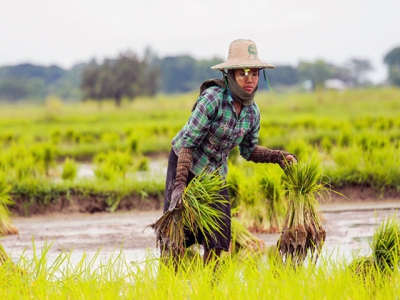Rice farmers face stagnant sales, lower prices

Rice prices have dropped recently after a long period of price hikes, presenting rice farmers with a challenge. Vietnam Economic News’ Nguyen Hanh spoke with Le Van Banh, former director of the Cuu Long Delta Rice Research Institute.
Rice prices have plunged since late 2018. Could you share the reasons?
The annual production output of rice in the Mekong Delta is estimated at 10-11 million tonnes. In the early part of the year, domestic rice firms had no orders from exporters and foreign customers, and therefore did not buy from farmers. This led farmers to accept lower prices.
Prime Minister Nguyen Xuan Phuc recently asked the Ministry of Finance to provide guidance for domestic rice businesses to buy in advance 200,000 tonnes of rice and 80,000 tonnes of paddy. Do you think this will help increase rice prices in the Mekong Delta?
I think this is just a Band-Aid solution that will help prevent rice prices from falling further but cannot push them up. Rice businesses will buy from farmers only when they can sell.
What do you think of the claim that China has created difficulties to hinder Vietnamese rice exports?
In fact, China did not create difficulties for Vietnamese rice exports. In the past, domestic companies exported rice to China mostly via border trade channels, but now they have shifted to official trade. The Chinese side inspected Vietnamese rice export companies and agreed to import only from eligible businesses. China is a large market with very high demand for rice. It imports rice from not only Vietnam but also other markets.
However, Vietnam faced stagnant rice sales to Chinese companies, leading to price drops and losses for farmers. The same thing happened with other agricultural products such as dragon fruit and watermelon.
The Ministry of Industry and Trade and the Vietnam Food Association predicted that rice exporters would face difficulties in 2019. What is your opinion?
In 2018, the domestic rice sector saw improvements in both price and quality. However, competition will be fiercer in 2019 as major rice importing countries tend to reduce purchases in an effort to become self-sufficient in terms of food, while rice-exporting countries keep increasing sales.
In the past, Vietnam, Thailand and India were major rice producers and exporters, but now Cambodia and Bangladesh have joined the playing field. Myanmar, which used to be a major rice producer, has recovered production following a period of decline.
Vietnam exported an average five or six million tonnes of rice per year. The same export amount is expected for 2019. However, prices will be different. Export prices increased strongly from US$452 per tonne in 2017 to US$502 per tonne in 2018. However, the export price of 2019 can hardly be as high as in 2018. There are different suppliers for foreign customers to choose, so they will buy from those offering the lowest prices.
What is a long-term solution for the domestic rice sector and rice exporters in particular?
Domestic rice businesses need to diversify export markets. At the same time, they should improve quality to enhance the competitiveness of Vietnamese rice in the global market. This will help Vietnam promote rice exports to discerning markets, such as Northeast Asia and Western Europe. In the long term, farmers should maintain their linkages with businesses.
Related news
 Agricultural exports face a series of challenges
Agricultural exports face a series of challenges Extensive international economic integration opens up many opportunities but also poses many challenges for agricultural exports
 Vietnam seeks sustainable agricultural exports via official channel
Vietnam seeks sustainable agricultural exports via official channel Vietnam looks to enhance the values of its agricultural products in order to ensure sustainable exports via official channels amid the process of international
 Mekong farmers use iPads to learn about ’smart’ agriculture
Mekong farmers use iPads to learn about ’smart’ agriculture Authorities in Đồng Tháp Province have taken measures to bring farmers closer to smart agriculture at a time when they are struggling to find buyers